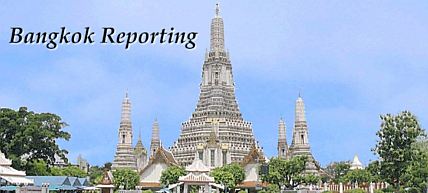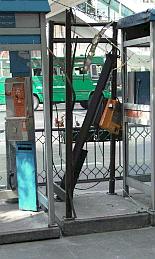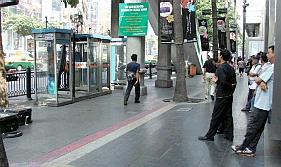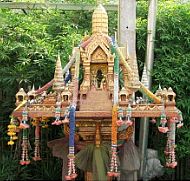
This post is the first in a series from our Bangkok correspondent, H. Numan.

As an avid reader of the Gates of Vienna, and living in the land of smiles, I would like to contribute as well with news and facts from my spot on the globe in a column Bangkok Reporting. My first report will be an essay to brief you about the general situation:
Thailand is a beautiful country in Asia. It has never been colonized, something the Thais are quite proud about. In fact, it was the result of luck and skillful bargaining. Thailand, or rather Siam as it was called then, was exactly on the borders of French Indochinese and British Indian influences. If the British showed a bit too much interest in Thai real estate, the king politely informed them that his French friends would like it. And likewise, if the French got overly interested in Thai real estate, the king told them his British neighbors didn’t appreciate it. Thus, Thailand remained free. Sure, they had to grant a lot of concessions. Even today some Thais are quite angry about France taking away their possessions in Cambodia. The British took parts of the Malay Peninsula. But nevertheless, Thailand remained free of Western influences for a long time.
Thailand means “land of the free”; a mixture of the Thai word Thai meaning free and the western word “land”. In Thai, the country is called Prathet Thai. Prathet is the Thai word for “land”. Thailand is mainly a Buddhist nation. Almost 95% of the population is Buddhist, 4% Muslim, and 1% Christian, evenly split between Roman Catholics (0.5%) and various Protestant denominations (0.5%). Most of those Muslims live in the deep south of the country, but you can find substantial Muslim enclaves in Bangkok as well. We have a lot of problems with the Muslims in the south, and I will be reporting about them. In Bangkok, no problems at all. I’ve been many times in several predominantly Muslim areas, without any problem.
A bit more about Thailand: Thais are taught from very young age that Thailand rests firmly on three pillars: the monarchy, the Buddhist religion and the nation itself. His Majesty King Bhumibol Adulyadej reigns under the name Rama IX and is highly revered. He is the longest-reigning monarch in the world: this year he will become 80 years old, and has held the throne for more than sixty years. Thais are highly deferential towards all monarchies but especially their own. All kings are held in high respect, but the most revered kings are Rama V (known as King Chulalongkorn in the West) and the present king, Rama IX. Royal occasions are national occasions and celebrated nationwide. Sunday 12 August, for example, was the queen’s birthday. In Thailand this is Mother’s day. Father’s day we celebrate, I’d say almost of course, on 5 December; the king’s birthday. You see portraits of members of the royal family literally everywhere. Even in a humble stall along the road you see a portrait of the king. Or maybe a little shrine dedicated to King Chulalongkorn. You see them certainly in all offices, almost all private homes, all hotels - just about anywhere.
In my office we have such a little shrine: a portrait of King Chulalongkorn, where some of my staff burn incense every day. On Thursdays (the day of his birth) they place some snacks, a little glass of Thai whiskey and a cigar next to the incense. He liked those very much. King Chulalongkorn is widely revered for abolishing slavery, starting modern administration (he set up the first real ministries), building railroads and public education. He was the first Thai monarch to travel abroad. In Sweden, in Ragunda, a Thai sala (pavilion) was build in 1997 to honor the centennial of that visit. When it was opened, many well-to-do Thais travelled to Sweden for the sole reason of visiting this pavilion.
Personally, I agree that King Chulalongkorn was a very important monarch for Thailand, but think he continued on the path set out by his father King Mongkut (Rama IV). This king is somewhat underestimated in Thai history. He was well educated, spoke many languages, amongst others Latin, and through his very capable policies Thailand remained free of colonial influences. Suppose you visit Bangkok right now: you see practically everybody wearing something yellow. Yellow T-shirts, polo shirts, skirts, neckties. This is to honor King Bhumipol, who was born on a Monday. The color of Monday is yellow. (All days of the week have their own color.) It’s not just a fashion statement: on every Monday you see more than 60% of all Bangkokians wearing a yellow shirt.
The problems in the south
As I said, Muslims and others live in Thailand in harmony. They have full freedom of religion. Far more, in a way, than they enjoy in the Western world. Wearing headscarves is not compulsory. You do see quite a few girls wearing a headscarf. The call to prayer is broadcast in the whole area by megaphones on electric poles. (Something which will soon be allowed in several Western nations as well…) Most of those wearing headscarves come from the south. And in the south we have some major problems.
The two provinces bordering Malaysia are predominantly Muslim. The sultans of that time (somewhere in the late 19th century) swore allegiance to the Thai king and their domains were integrated in Thailand, but not without difficulties. The Deep South is the Thai equivalent of Siberia. Generations of incompetent and/or corrupt government officials were send in disgrace to a posting there. In the South they could do as they pleased, provided they acted with some discretion. Not very surprising, the Southerners did not really appreciate this. Many Thai governments, especially around the WW2 period tried to enforce ‘Thainess‘ nationwide, also in the South. Thainess includes among others Buddhism and the Thai language, and was resented by the Southerners. The Southerners are ethnically, culturally and linguistically far more related to Malaysia. This enforced Thainess met some serious resistance.
- - - - - - - - -
Later we saw the communist revolt in Malaysia. It took many years to subdue the revolt. Mainly (but not exclusively) because communist guerillas often crossed the border when in trouble; to retreat for some time into Thailand. The British and Malaysian army could not follow without starting a real war. The current problems in the South are, to my knowledge, not supported by the Malaysian government. However, the Malaysian government didn’t forget the Thai attitude to their problems, and won’t do a lot to apprehend Muslim insurgents crossing the border. More or less in the line of: “Here scumbags. Have a cigar out of your own box. A bit smelly, eh?”
 The previous risings and revolts weren’t really suppressed. In the beginning of the 90’s a peace was negotiated between parties. For some time the situation remained calm. Law and order were maintained by the Royal Thai Police and locally recruited (mainly Muslim) army regiments. This changed under the early administration of the (ousted) premier Thaksin Shinawatra. Some incidents flared up and he acted with force. Martial law was declared, the police gave over the security task to the army, and regiments from the Northeastern provinces (read that as: staunchly Buddhist regiments) were moved in. The iron fist approach has not worked so far. Tensions are high, and guerilla attacks happen daily. The monthly death rate is well over a 100 casualties. Compare this with the civil war in North Ireland, where in 30 years the total casualty rate is slightly higher than our yearly casualty rate… In other words: more people are killed annually than in 30 years in Northern Ireland.
The previous risings and revolts weren’t really suppressed. In the beginning of the 90’s a peace was negotiated between parties. For some time the situation remained calm. Law and order were maintained by the Royal Thai Police and locally recruited (mainly Muslim) army regiments. This changed under the early administration of the (ousted) premier Thaksin Shinawatra. Some incidents flared up and he acted with force. Martial law was declared, the police gave over the security task to the army, and regiments from the Northeastern provinces (read that as: staunchly Buddhist regiments) were moved in. The iron fist approach has not worked so far. Tensions are high, and guerilla attacks happen daily. The monthly death rate is well over a 100 casualties. Compare this with the civil war in North Ireland, where in 30 years the total casualty rate is slightly higher than our yearly casualty rate… In other words: more people are killed annually than in 30 years in Northern Ireland.What is new is that nobody really knows what the goal is of the insurgents. Freedom of religion? They already have that. Their own language? They already have that too. A less harsh law? Maybe, but compared to Malaysia, Thai law is anything but harsh. Full independence? Yeah, the world is really waiting for a postage-stamp sized Shariah republic! The old independence movements seem to play second string at best. There is no known organization, but more or less the actions of groups of individuals. There is no set policy; it seems like: “Do whatever you (the Thai government) think is best. We just kick the Thais out, and we don’t care much how we do it. We don’t want independence; we want to be left alone. Want to use heavy force? Great! Please do! We invite you to!”
 But there is a definite pattern of inflicting terror and fear on local Thai residents in the south: Thai villages are torched. Individuals are beheaded. Minivans, the normal means of communication between the villages, are held up and attacked. In a recent attack everybody was killed except the driver, who was Muslim. Schools are a prime target, so much so that many are on guard day and night. Teachers have been issued firearms and training by the government. Please notice that all Southern inhabitants are Thai. When I refer to ‘Thai villages’ this means villages mainly occupied by Buddhist Thais. A lot of Buddhist Thais went to live in the South for various reasons, and they are being seriously harassed to move out again.
But there is a definite pattern of inflicting terror and fear on local Thai residents in the south: Thai villages are torched. Individuals are beheaded. Minivans, the normal means of communication between the villages, are held up and attacked. In a recent attack everybody was killed except the driver, who was Muslim. Schools are a prime target, so much so that many are on guard day and night. Teachers have been issued firearms and training by the government. Please notice that all Southern inhabitants are Thai. When I refer to ‘Thai villages’ this means villages mainly occupied by Buddhist Thais. A lot of Buddhist Thais went to live in the South for various reasons, and they are being seriously harassed to move out again.After the coup d’etat in 2006 (the silk revolution) it was hoped the situation would calm down. General Sonthi Boonyaratglin became prime minister and is Muslim himself, The first to attain this high office. It was seen as a open hand from the government to start negotiations. So far, this never happened. On New Year’s Eve a series of eleven bombs went off in Bangkok (one about 200 meter from my house) killing a number of people. No motive was given, perpetrators didn’t claim responsibility. It just happened. It might very well have been done by somebody else, but I am very hard pressed to imagine somebody setting off eleven bombs in a major city for gambling debts, revenge or something similar.


About myself
I am a Dutch national, and was offered a job in Bangkok in 1994. I kind of liked it, apparently, as I am still here. As soon as I moved into Bangkok, I went to school to learn the language. Well, almost. I had to wait for three whole days to begin my first lessons. My job is in IT. I started as system administrator, and now work mainly as webmaster in designing beautiful (?) or at least informative sites. I’m not religious, or a bit more strongly phrased: atheist. However, I am interested in religion. All religions. Not that I like Mohammedanism, but I did read the Koran.
 My hobbies are history in general, Thai history if I can find it. And “spirit houses”. Something that is almost unique to Thailand are little shrines dedicated to the spirits of the land. You see them everywhere in the Kingdom. I collect pictures about them, and try to find out the customs related to spirit houses.
My hobbies are history in general, Thai history if I can find it. And “spirit houses”. Something that is almost unique to Thailand are little shrines dedicated to the spirits of the land. You see them everywhere in the Kingdom. I collect pictures about them, and try to find out the customs related to spirit houses.As an emigrant myself, I can say that the most important thing one has to do is adapt to your new country. 65 million Thais do not have to changes their ways to make me feel comfortable, I have to adapt to them. They don’t have to learn my language, I have to learn theirs. If something is offensive to me: tough luck. I am a (long term) guest, and have to behave accordingly.
Does that say I am Thai? Far from it. Does that mean I have to give up being Dutch? Not at all! All the complaints I hear from left-wing sources are completely WRONG. If Muslims want to live in Sweden, they HAVE to learn Swedish. Likewise, if they want to settle down in The Netherlands, they have to learn the language, or bear the costs themselves if they cannot or want not. Nobody forces me to learn Thai. But it is highly appreciated. Nobody will force me to read and write Thai. But nobody will hand out translations to accommodate foreigners. If you can’t read it, hire a translator.
In other words: act with common sense, and behave with common sense. And all will be well.
Sometimes.
This was Bangkok reporting,
H. Numan.

8 comments:
The problem with the spread of Islam is that they want to regulate human joys and creativity and harness them to an Eternal Bowing Machine.
The Mill of their 'God'.
Grinding our nature to medieval theocratic dust.
The Thais should try to encourage the Muslims who have invaded their land to return to Mecca, since such steroetyped Submissives will never be comfortable among a people who love life, respect the mundanely spiritual -with these little "houses" (Bamiyan Buddhas in waiting, most likely) you mention- and a culture which practices Mohammad-forbidden representational art.
The only phrase I want to come true for Islam -as an ideology- is the Dutch slogan: OP is op.
A good report. Thanks for it.
Best of luck.
And Sterkte hoor!
The Thais should try to encourage the Muslims who have invaded their land to return to Mecca
Actually, if you read the post carefully, the Buddhist Siamese Kingdom annexed a Muslim Malay Sultanate.
Great stuff.
"As I said, Muslims and others live in Thailand in harmony. They have full freedom of religion. Far more, in a way, than they enjoy in the Western world. Wearing headscarves is not compulsory." - very much like in Israel, except for the "living in harmony" part, which has only been going downhill since October 2000. Don't count on it staying that way in Thailand either. Signs of weakness (dhimmitude) make them bold.
The part about "resistance to Thainess" is also familiar. The Islamic jihad against Israel, too, is carried out under the banner of "resistance to Judaization", making it out as if it were all about self-determination--a narrative which the Western Left swallows voraciously.
"What is new is that nobody really knows what the goal is of the insurgents." - nobody who gets his info only from the MSM, of course.
"But there is a definite pattern of inflicting terror and fear on local Thai residents in the south: Thai villages are torched. [...] A lot of Buddhist Thais went to live in the South for various reasons, and they are being seriously harassed to move out again." - there is a definite pattern, but it isn't limited to Southern Thailand. Look at Kosovo. Look at the Ethiopia-Somalia border. And Israel, needless to say. It's the "salami method" everywhere: cut out pieces of non-Muslim sovereignty (whether land or culture) bit by bit, until the conquest is complete.
There is no politically correct solution to this. Only mass expulsion of the Muslims from within and near the non-Muslim states will work.
"General Sonthi Boonyaratglin became prime minister and is Muslim himself, the first to attain this high office. It was seen as a open hand from the government to start negotiations. So far, this never happened." - why should moves to appeasement, a sign of weakness, make that happen? Only the clueless statesmen of our age, thinking in terms of material benefits alone (the Malthusian war of survival), can delude themselves so.
Time to consider a change of strategy. Of course, I should clean up my own house first (Olmert--'nuff said), but this is a worldwide truth.
To the anonymous commenter:
Were this truly a nationalistic dispute, then I would agree about that way of viewing the current state of affairs in Southern Thailand, just as I and most other Israelis gave seven years (1993-2000) of credit to the proposition that giving Judea, Samaria and Gaza to the Palestinians would bring peace.
But this isn't a nationalistic dispute. It isn't about Malays clamoring for independence, nor of "Palestinians" wishing for the same. Those are integral parts of the Islamic jihad. That changes the way things must be viewed entirely. I will quote Hugh Fitzgerald of Jihad Watch, in a comment he made (comments of such length by him usually end up as posts later), on Giuliani and the "Palestinians":
"[...] Not only a so-called 'Palestinian' state, but any further surrender by Israel of territory to which it has legal, historic, and moral title (which is to say, every square inch or dunam it currently possesses or controls) will merely whet, not sate, Arab Muslim appetites.
"[...] The whetting of those appetites by any further Israeli concessions will also feed into Muslim triumphalism. 'We are winning against Israel' is not a sentiment one wishes the Arabs to feel, for it will feed into their pressure on other areas, not just the obvious places akin to Israel in the Muslim view because they were once part of Dar al-Islam, once ruled by Muslims, such as Spain, Sicily, Greece, the Balkans, Bulgaria, Rumania, much of Hungary, much of Russia, almost all of India, but also hearten Muslims in Western Europe [...]"
It's the same here. If the Muslims manage to get land concessions out of Thailand, out of "The Land of the Free", the land that prides itself on never having been colonized by Western powers, then that will be a tremendous boost to jihadists elsewhere. Islam is programmed to victory and feeds on every scrap of it, no matter how far-fetched--hence the Egyptians' construing of the 1973 war as a victory although Cairo was nearly taken, and Hizbullah's declaration of last year's war in Lebanon as a victory over the Israelis. Real victories would be absolutely devastating to non-Muslims worldwide--they would be towering building-blocks for that powerhouse of Islamic supremacism that we can call, "Jihad pays".
It is in the interests of us all to support Thailand in its resistance to Islamic imperialism. It's not a local problem. It's marketed as such for the consumption of the useful idiots on the Western Left, but in reality it's part and parcel of the global jihad. It's far away only in the geographical sense.
Thanks for the heads up on Thailand
I very much agree with ZionistYoungsters interpretation of our general situation. About cleaning our own house first though, I don't think we can afford to think like that anymore. Both the left and Islam, very much plays the international scene, and we must do the same. But as I understood it, that was also the general sentiment.
The left are masters at using international pressure as an internal political tool. If things don't go their way, they call their international friends and arrange boycotts and condemnations against their own countries. And then they use these events to attack their internal political opponents. Islam does the same, but in a much less subtle way.
At the Anti-Jihad meeting in Copenhagen this spring, I was talking about these things with a Norwegian guy. And he expressed it in a brilliant way. He said; The left has got everything right, except politics.
We should look at how the Americans are doing things. They have right wing grassroots movements that should be an inspiration to the rest of the west. During the motoon crisis in Denmark, the left where playing their usual game and talking about how our evil right wing government had ruined our international reputation. When the buy Danish campaign started an many began to express support. The left and the MSM went completely silent on the issue and the right just couldn't stop laughing at them.
The idea that we should clean our own house first is a noble one and this idea is strong with right wingers in Europe. But it also helps the enemy to isolate and demonise us one by one. So it seems that the Americans have it right on this one.
And things are starting to change. A week ago or so, a far left group in Denmark called for a boycott of Israel for reasons I cant remember and don't care about. There is nothing new in this. But as a new thing, at least in a Danish context, the right is now responding
And this is a growing phenomenon. We still have a very long way to go, but it also seems to be taking on momentum. Well you cant really boycott Palestine, other then stop funding them, but the thought should count for something :-)
We can get a huge advantage over the left here. The right has a pretty tough skin when it comes to international pressure. But the left has not, they are conditioned to wanting to give in to it, do to their own tactics. So as the right start to play this game a little batter, they will become very weakened and confused.
Another thing that would be great, is if the European Jews would become more supportive of European National Movements. Its understandable that they are not. But we are natural allies in the future to come.
And we should strongly support Thailand's right to protect herself and remain a peaceful Buddhist country by whatever means necessary.
Trackbacked by The Thunder Run - Web Reconnaissance for 08/16/2007
A short recon of what’s out there that might draw your attention, updated throughout the day...so check back often.
anon-
So Mohammad was Thai?
What the Thais in the south want is their own State - many seem to take the line that what works for the Palestinians can work for them as well.
I wouldn't go so far to say that their language is close to Malay - many in the south do understand Malay somewhat but the predominant language in the Southeast is Kelantanese and over towards Penang they speak Thai and Malay.
Lao
An American Expat in Southeast Asia
H. Numna,
Very informative post. I am an American who has traveled to Thailand twice for a total of 5 weeks duration. I find Thailand a completely fascinating place, and it is one of my favorite countries on earth. Beautiful (stunning, in many cases) land & water, warm people, and an independent and interesting culture make a great combination.
I'm saddened to read news stories and accounts of the "restive" south; yet another fine land terrorized by 7th century Muslim extremists. Being American, we know of this, and you being Dutch certainly know of this.
Please keep the reports coming, and I will check back often. Please also update us potential travelers to Thailand on the present risks involved in visiting Thailand (even in the north, Bangkok, etc.), and how the average Thai is faring.
Again, well done.
Post a Comment